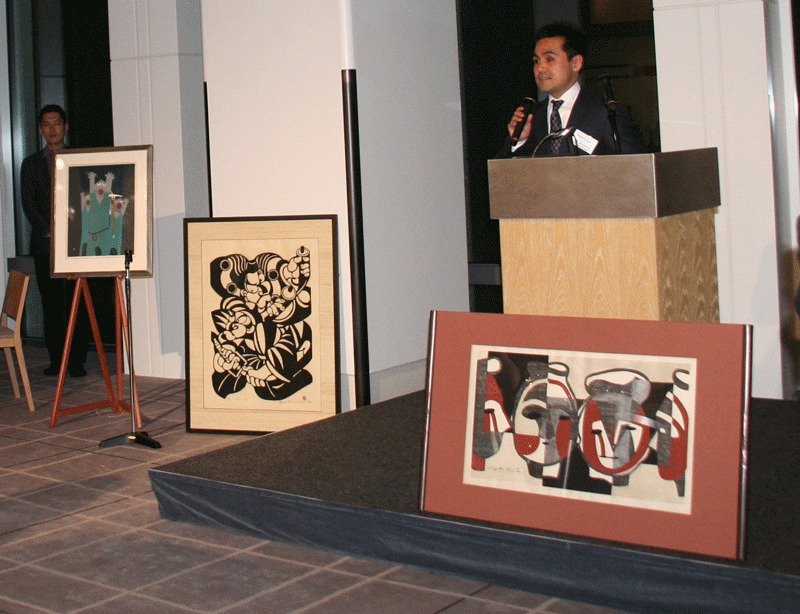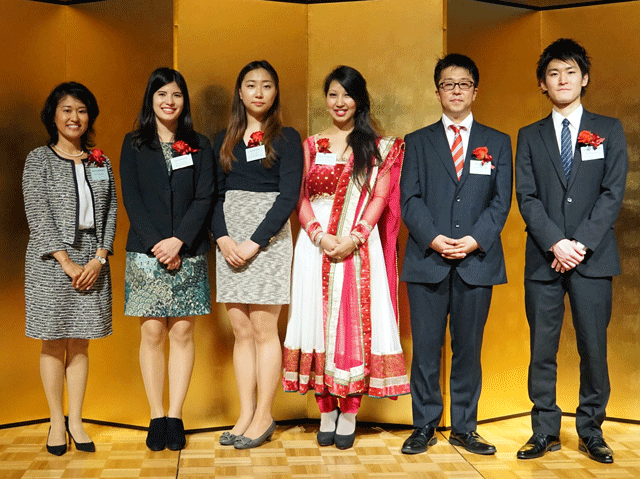CWAJ scholarship recipients for 2015, from left to right: Mayumi Imahashi, Taeko Itabashi, Hojung Jung, Samata Tamrakar, Masayuki Izumi, Makoto Tokumitsu
By Sarah Custen
The College Women’s Association of Japan (CWAJ) has an impressive set of numbers to show off: over 60 years providing scholarships and opportunities to students of all ages, nationalities and backgrounds; 2 upcoming exhibitions that will tour Japan and then the US, featuring a combined 190 artists and over 200 prints; and dozens of programs and projects designed to provide community service, enhance cross-cultural awareness, and support the dreams of a broad spectrum of outstanding individuals, in Japan and abroad.
Yet numbers do not do CWAJ’s mission justice, and no matter how many aspiring dreamers and artists they support, they seek to do better and reach more people. This year marks CWAJ’s 60th Print Show, featuring the top 60 competition entries from young artists (40 and under) as well as a special exhibition, “Kanreki: a 60-year Journey,” which traces the Print Show’s history through 160 works contributed by 130 invited artists. After showing in Tokyo and Kobe, the exhibition will move to Cape Cod in 2016. “It is our hope that this landmark event will attract significant financial support,” said CWAJ President Nancy Nussbaum, “to enable us to offer a greater number of scholarships.”
This year, CWAJ will award 14 million yen in scholarships across a wide range of categories, including a Fukushima Relief Scholarship, a non-Japanese graduate scholarship (supported by the Tokyo American Club Women’s Group), scholarships for Japanese women to study abroad, and scholarships for foreign women to study in Japan. Their scholarship program is unique in that it is open to women of all nationalities, as well as visually impaired Japanese men and women, to study both domestically and abroad, with no age limit or prescribed area of study.
To date, CWAJ has sponsored nearly 800 students in the pursuit of overseas study opportunities, students who might otherwise have slipped through the cracks. One such example is 2005 recipient, Makoto Ogoda, a visually disabled man who fought hard to become a lawyer, passing the bar exam on his fifth try. His experience of overcoming prejudice and finding strengths in his “handicap” led him to write a semi-autobiographical novel, “Zenmo no boku ga bengoshi ni natta wake” (“The Reason a Blind Guy Like Me Became a Lawyer”), which was made into a successful TV drama last December.

2005 Scholarship recipient Makoto Ogoda addresses an audience at an evening celebrating the Print Show’s 60th anniversary
The 2015 CWAJ scholars have their own incredible histories to share. Mayumi Imahashi, M.D., was struck four years ago by a young man she treated whose advanced AIDS limited not only his life expectancy, but also his abilities to achieve his goals. Imahashi understood that with early treatment, the man would have been able to work and lead a normal life. As she studies at the School of Public Health, University of Texas, Imahashi is working to eliminate prejudice against HIV by educating Japanese teenagers and their parents and providing better access to testing.
Samata Tamrakar, another 2015 award recipient, also seeks to dispel myths that act as barriers to proper treatment and healthcare. A Nepalese native, Tamrakar has come to Japan to further her studies in neurosurgery, aiming to be one of the very few female neurosurgeons in Nepal. She wants to expand healthcare beyond Kathmandu into outlying rural areas and replace folkloric superstitions with modern medical information.
Funding for the scholarships comes from the annual print show as well as individual and corporate donations. CWAJ is fully self-funded in all their operating expenses, meaning that 100 percent of all donations go to their Scholarship and Education Programs. In addition to increased HIV awareness and testing in Japan and the expansion of medical information and neurosurgery in Nepal, 2015’s CWAJ scholars are committed to multicultural video journalism, the development of autonomous vehicles to increase personal mobility for the disabled, social welfare in Japan, studying herbal medicine’s effects at the genetic level, and public health for women and children in Fukushima.
“Across the globe, educated women are powerful agents of social change, transforming families, institutions and societies,” said President Nussbaum. She hopes that the 60th anniversary of the print show and its related events will draw more people and more support in furthering CWAJ’s scholarships and other programs, as a step to bettering the world for everyone. “As Kofi Annan has said, ‘the education of girls and young women is the single highest returning investment in the world today.’”
To join, donate, or find out more about how you can make a difference, visit www.cwaj.org, or email [email protected] or [email protected].
The 60th CWAJ Print Show—Tokyo
October 30–November 1, 2015
Tokyo American Club
Associate Show
October 19–November 8, 2015
Fred Harris Gallery, Tokyo American Club









